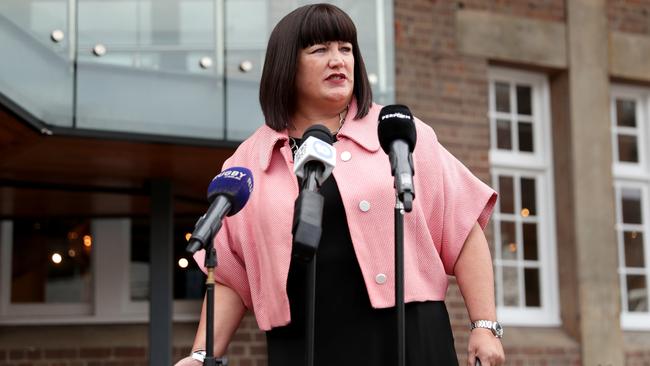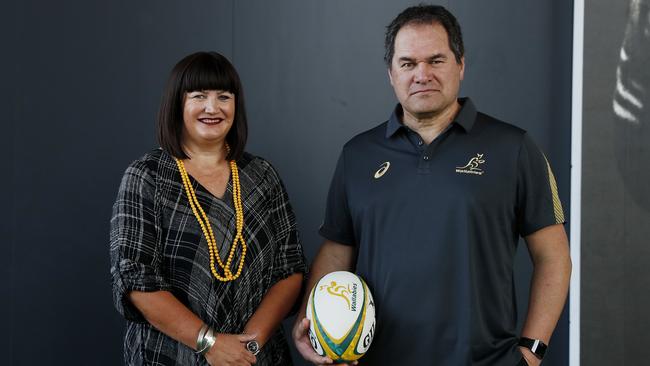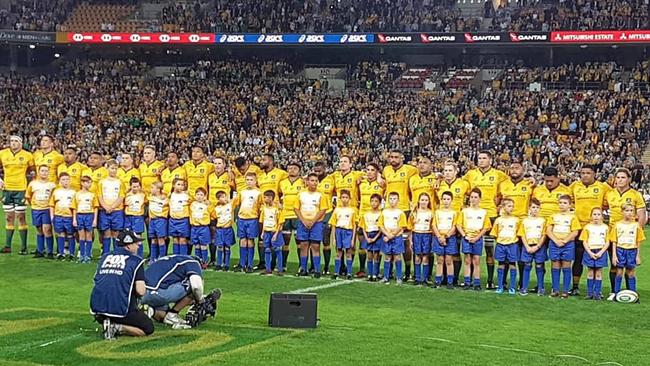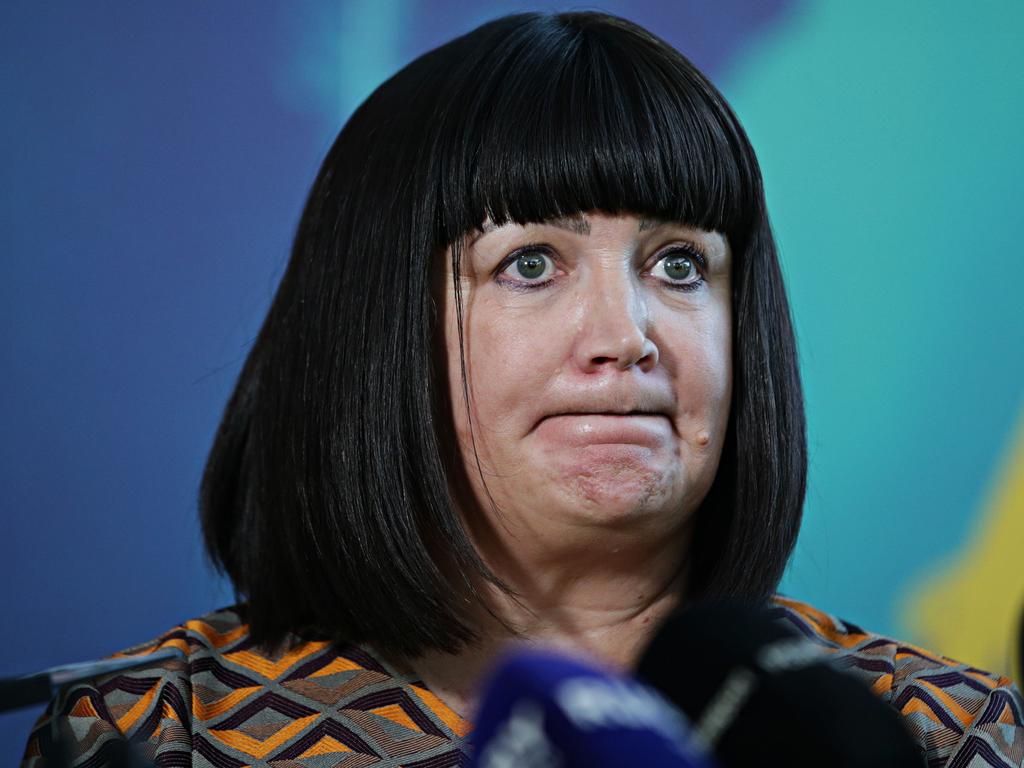
We meet the same people there every time — selfish and arrogant Rugby Australia administrators
Never was that more manifest than at the AGM earlier this week. Can you believe this crowd gave themselves a 72 per cent performance rating for the year 2019?
As one of my correspondents said, “They must be kidding. Gave themselves a score of 20/25 for participation and used their creative number counting to indicate they had 85,000 players and 35,000 club 7s players (Many counted in both groups). For igniting passion in the game they gave a score of 21/25. This suggests they really are delusional.” We are in the realm of the absurd.
The new chairman, Paul McLean, who should have resigned because he has been a member of the board that has presided over every disaster; yet in one breath he told the AGM that for three weeks the board had been getting advice on the safe harbour provisions of the Corporations Act, but apparently felt comforted by the federal government’s comments that they aren’t pursuing directors for insolvent trading.
In the next breath he said the business was solvent as of December 31. But he did not produce the financial reports to prove it.
What is the point of an AGM if an arrogant board fails to meet its most basic obligation to members to allow them to consider the financial statements of the organisation?
The audited sign-off of the financial statements should have been provided to members 21 clear days before the AGM. All the nonsense about coronavirus, COVID-19, is a distraction.
The rugby family must understand they have a board that refused to present financial statements they are entitled to see.
That brings us to the guts of it.
But don’t expect McLean, or the CEO Raelene Castle to answer two simple questions.
Did Rugby Australia trade while insolvent in 2019, before COVID-19? And if their answer is no, why then were the financial statements from 2019 not presented at the AGM on Monday of this week? In case they don’t have a calendar they should know that COVID-19 has only been an issue since March 2020. And in case they don’t know, the annual report is for the 2019 season’s calendar or fiscal year.
In April last year, Rugby Australia presented the 2018 Annual Report with complete financial figures. Why is it that they couldn’t present the 2019 financials at the 2020 AGM as they are obliged to do? Members are entitled to know whether Rugby Australia was solvent in 2019 or not.

We should not imagine for one moment that these aren’t very serious questions.
The penalty for directors allowing a company to trade while insolvent include a fine of up to $220,000 and imprisonment for up to five years. Being found guilty of the criminal offence of insolvent trading leads to a director’s disqualification.
It is a simple issue.
A company becomes insolvent when it is unable to pay its debts when they are due.
Even if the organisation was not insolvent in 2019, its financial state was parlous. The unaudited figures suggest a $9.4 million loss and a costs blowout of $6.6 million.
McLean and Castle, and the board of Rugby Australia, cannot blame their financial mismanagement on a virus that had no impact on the 2019 financial figures. On top of this, Castle indicated she will take a 50 per cent pay cut, but then stood down 100 of her fellow Rugby Australia staff members. That is, I suppose, her definition of fairness and equitability. Castle will now take home more than $400,000 a year and most of her colleagues will take home nothing for three months.
But that has been the working model of this administration. For months and months they have taken everything they could get their hands on and the rugby family have had to go without.
Dump 100 people and direct them to Centrelink. Dump your financial responsibilities on the Australian taxpayer.
The federal government should have nothing to do with a bail out of Rugby Australia for two reasons. They have been the architects of their own demise; and, secondly, they have dumped their staff costs on the welfare system.
The Rugby Australia board this week took on three new directors. But the directors responsible for the financial ruin of our game include Cameron Clyne, Brett Robinson, Castle, Paul McLean, Pip Marlow, Hayden Rorke, Phil Waugh, John Wilson and Tim Gavin.
The rugby family would want to hold all of these people accountable for the financial carnage of 2019, but the means for doing this has been denied them.
Why did these directors fail to put aside a contingency fund, or “war chest” when the game was generating $150m in revenue each year from broadcast deals and sponsorship?
But instead of planning for the future, the Rugby Australia board allowed staff levels to bloat out to 150 people at Moore Park, with a further 240 staff employed in the Super Rugby franchises. What on earth do these people do?
It is not as if we have not had reasons to plan for potential disasters and financial stress. Only 10 years ago we had the GFC to contend with. Then last year there was a terrorist attack in Christchurch which impacted severely on our game. Blind Freddy would understand that we live in uncertain times and contingency planning is part of prudent leadership.
Castle is now running around like a headless chook talking about setting up think-tanks to consider possible scenarios. Let me say, in any think-tank, the current board would certainly be populating the shallow end.
It prompts the memory of 1789, July 14. The storming of the political prison known as the Bastille. The analogy has validity. The Bastille represented royal authority in the centre of Paris. The prison contained only seven inmates but the storming of it was seen by the revolutionaries as a symbol of the monarchy’s abuse of power.
And that is the common thread with Rugby Australia.
Way back then in Paris, the common people established parallel structures by which the country should be governed. The then British Ambassador to France, two days after the storming of the Bastille, reported to the British Secretary of State that, “From this moment we may consider France as a free country, the King a very limited monarch and the nobility as reduced to a level with the rest of the nation.”
This is what we seek. These rugby warlords in their ivory towers, with locks on the inner sanctum, need to be reduced to “a level with the rest of the nation”.
When you see the carnage this board is responsible for it is easy to understand the spirit of revolution. It is time for the rugby community to band together in their own contemporary revolution and hound these so-called professional elite, the “nobility”, out of their ivory tower at Rugby Headquarters.
This game was bankrupt, both morally and possibly financially in 2019, well before COVID-19.
Grassroots rugby will survive and eventually flourish because grassroots rugby received nothing from the professional game that calls itself Rugby Australia. In fact, they should rename themselves “Professional Rugby Australia minus Western Australia” because that’s all they are.
They care about no one.

Our schools and clubs will carry on as usual once we get past this rugby virus; and they will continue to produce players for the future. Forget SANZAAR, forget Super Rugby, the future is a local, regional, domestic competition.
Sponsors will come back to the game, but only when this lot are gone and administrative cleanskins, with knowledge and a passion for the game, are put in charge. The game can’t continue as it is. There is no broadcasting deal for the future; the likelihood of no games played in 2020, no sponsorship or broadcast revenue, and this on the back of terrible international results.
Continue as we are and another Super Rugby franchise will be thrown under the bus, which is completely out of petrol.
How ironic that Rugby Australia’s main sponsor, Qantas, is now begging for a government bailout. How the mighty have fallen. Only last year the Qantas CEO Alan Joyce was hellbent on bringing Israel Folau to his knees. Now it’s Joyce begging for mercy as the airline he controls flounders without a contingency plan.
While it is painful to know that 100 staff members at Rugby Australia and another 200 staff members at the Super Rugby franchises are joining the queues at Centrelink this week, our game needed a major correction.
How is it that Rugby Australia and the four Super Rugby franchises could between them have 420 people employed?
As I have said many times, the Rugby home is no different from your own suburban house. If you spend all your money on the roof and nothing on the floor, the house collapses. We need to spend money on grassroots rugby, schools rugby, subdistricts rugby, club rugby and state rugby.
The national game will thrive.
Who knows, with such a simple structure, Andrew Forest may be interested in backing the game. In a brave new world, the time is right.
In Act 1 of Shakespeare’s Hamlet, the key protagonist, Hamlet, laments “The time is out of joint: O cursed spite, that ever I was born to set it right!”
Hamlet felt an obligation to set things right, to do something, to avenge the crime against his father. This board have committed a metaphorical crime against our game. The time is certainly “out of joint”. We must collectively shoulder the burden to “set it right.”






We have been around this track before and yet we always finish up at the same destination.